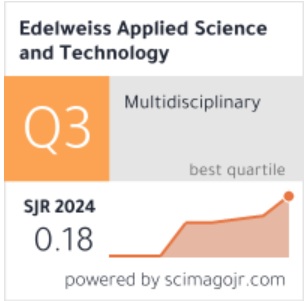All research articles submitted and accepted in 2026 will be eligible for a 100% waiver of APC if either the corresponding author or a co-author is recognized among the top 2% of most-cited scientists worldwide, according to the most recent Stanford/Elsevier citation database or a similarly recognized index.
Reviewers Guidelines
Overview of the Peer Review Process
At Edelweiss Applied Science and Technology, we are committed to ensuring a fair, unbiased, and timely peer review process. We follow a single-blind review system, where reviewers are aware of the authors’ identities, but the authors do not know the reviewers.
We sincerely thank all our reviewers for their invaluable time, expertise, and dedication. The peer review process plays a critical role in enhancing the scientific merit, clarity, and credibility of submitted manuscripts, ultimately shaping them into high-quality, citable publications.
Reviewer Selection
Reviewers are selected based on author suggestions, subject matter expertise, and bibliographical relevance to the submitted manuscript. Active and potential reviewers are expected to maintain a high level of academic integrity and expertise in their respective fields.
Roles and Responsibilities of Reviewers
Reviewers are integral to the editorial decision-making process. Their primary responsibilities include:
- Assessing Scientific Merit: Evaluate the originality, significance, methodology, and validity of the research.
- Ensuring Clarity and Relevance: Judge the clarity of writing, logical structure, and relevance to the journal's readership.
- Providing Constructive Feedback: Offer detailed and constructive critiques that help authors improve their manuscripts.
- Upholding Confidentiality: Treat all manuscripts as confidential documents. Do not share or use information from them prior to publication.
- Declaring Conflicts of Interest: Immediately inform the assigning editor if any conflict of interest arises and decline the review if necessary.
Communication Protocol
- Reviewers should maintain open communication with the assigning Editor regarding any ethical concerns such as plagiarism, duplicate publication, or conflict of interest.
- Scientific recommendations and critical evaluations should be directed to both the editor and authors, while sensitive issues must be discussed exclusively with the editor.
Review Content and Structure
Reviewers are expected to provide objective, evidence-based, and well-structured feedback, avoiding personal criticism. Reviews should include:
- Summary Evaluation: Briefly summarize the article’s objective and contribution.
- Strengths and Weaknesses: Assess scientific strengths, limitations, and overall impact.
- Recommendations for Improvement:
- Clarity of hypotheses and objectives.
- Appropriateness of study design, ethical considerations, and statistical analyses.
- Adequacy of data to support conclusions.
- Completeness and currency of references.
- Final Recommendation: Indicate whether the manuscript should be:
- Accepted
- Revised (minor or major)
- Rejected
- No recommendation (in rare cases)
Note: Unpublished material should never be cited or used by reviewers.
Confidentiality and Ethical Compliance
Unpublished manuscripts are classified and confidential. Reviewers must adhere to COPE (Committee on Publication Ethics) guidelines, ensuring:
- Integrity in assessment
- Impartiality in judgment
- Respect for authorship and intellectual property
Checklist for Reviewers
Please confirm the following during your review:
- The manuscript aligns with the journal's scope and readership.
- Each section (title, abstract, methods, conclusions) is clear, coherent, and relevant.
- Experimental controls and ethical standards are properly addressed.
- Statistical analyses are appropriate and well-documented.
- Figures, tables, and text do not repeat information unnecessarily.
- Citations are comprehensive and up-to-date.
- Length and structure of the manuscript are appropriate, with specific suggestions for expansion, condensation, or reorganization if necessary.
Acknowledgement of Reviewer Contribution
Peer reviewers play a crucial role in maintaining scientific integrity. Their voluntary service ensures that research publications meet the highest academic standards and contribute meaningfully to the field.






